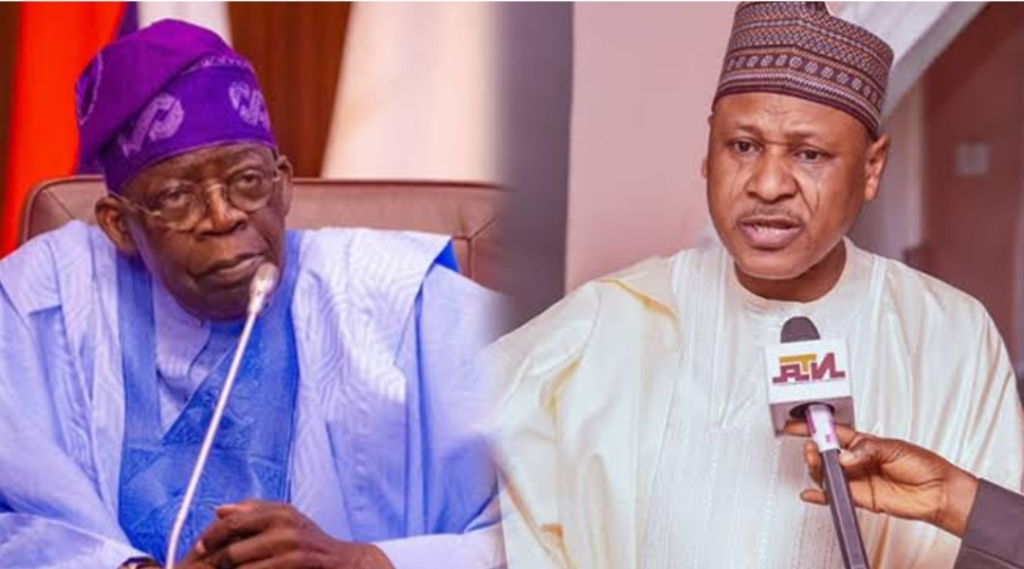Top Headlines
How schemers in the Presidency and Information Ministry misled Tinubu to remove Pedro as NTA DG and recall Dembos

- /home/ariseafr/public_html/wp-content/plugins/mvp-social-buttons/mvp-social-buttons.php on line 27
https://ariseafricanews.com/wp-content/uploads/2025/09/image-2-1000x600.png&description=How schemers in the Presidency and Information Ministry misled Tinubu to remove Pedro as NTA DG and recall Dembos', 'pinterestShare', 'width=750,height=350'); return false;" title="Pin This Post">
- Share
- Tweet /home/ariseafr/public_html/wp-content/plugins/mvp-social-buttons/mvp-social-buttons.php on line 72
https://ariseafricanews.com/wp-content/uploads/2025/09/image-2-1000x600.png&description=How schemers in the Presidency and Information Ministry misled Tinubu to remove Pedro as NTA DG and recall Dembos', 'pinterestShare', 'width=750,height=350'); return false;" title="Pin This Post">
President Bola Ahmed Tinubu’s initial decision to appoint Rotimi Pedro as Director-General of the Nigerian Television Authority (NTA), replacing Salihu Dembos, whose three-year tenure had expired in September 2025, was lawful and appropriate. However, political hawks within the Presidency and the Federal Ministry of Information manoeuvred behind the scenes, misleading the President into reversing the appointment and granting Dembos an extra year in office, Lookman Usman reports.
Introduction
The behind-the-scenes drama that ensured Salihu Dembos would remain as NTA’s Director-General beyond his statutory three-year tenure did not begin on August 23, 2025 — the day Segun Imohiosen, Director of Information and Public Relations at the Office of the Secretary to the Government of the Federation, announced Rotimi Pedro as the new DG.
On that day, alongside Pedro, three other key appointments were announced: Karimah Bello as Executive Director of Marketing, Stella Din as Executive Director of News, and Sophia Issa Mohammed as Managing Director of NTA Enterprises Limited. But what played out publicly in August 2025 had actually been set in motion nearly two years earlier.

How Dembos’ illicit tenure elongation started in 2023
The plot to fraudulently elongate Dembos’ tenure began on October 19, 2023, when then-presidential spokesperson Ajuri Ngelale announced the appointment of new Director-Generals and Managing Directors across parastatals under the Federal Ministry of Information and National Orientation.
While new appointments for NAN, VON, NOA, FRCN, and ARCON followed due process, eyebrows were raised when Dembos was included in the list as NTA DG — because he had already been appointed by former President Muhammadu Buhari on September 21, 2022, for a three-year tenure.
Re-announcing his appointment barely a year into his statutory term baffled industry insiders. To many, it was akin to re-electing a politician who had served only one year of a four-year term. Even more concerning, in the thirteen months Dembos had spent at the helm, NTA’s performance had declined rather than improved.
Progressive voices around President Tinubu — determined to restore NTA’s lost glory — urged him to appoint competent professionals to lead a turnaround. After a thorough evaluation, Rotimi Pedro and three others were identified as capable reformers. The President approved their appointments.
But that was just the beginning of a bigger fight.

The schemers fought back
Sensing defeat, a group of entrenched power brokers within the Presidency, Ministry and NTA launched a coordinated counter-offensive. The official communication channels that typically announce government appointments deliberately withheld a press release confirming Pedro’s appointment.
However, once congratulatory messages began circulating, news of Pedro’s elevation leaked onto social and mainstream media. To regain control of the narrative, the schemers recruited friendly journalists to discredit the appointment.
Paid opinion writers described the leadership changes as “confusion at NTA,” falsely claiming that the appointments had not been confirmed by the Federal Government or communicated to NTA management — thereby “leaving workers in uncertainty.”
But insiders revealed that the majority of NTA staff celebrated Pedro’s appointment, seeing him as a breath of fresh air after Dembos’ widely criticised leadership, which they blamed for low morale, poor welfare, and declining standards.
When these smear campaigns failed, the schemers escalated their efforts — this time targeting a presidential aide believed to have informed the President of Dembos’s expired tenure. Behind closed doors, the character assassination intensified.
From scheming to blackmail
With pressure mounting, the schemers deployed their most potent weapon: direct political influence. Senior politicians and well-connected government officials lobbied President Tinubu aggressively, urging him to allow Dembos to “complete his tenure.”
One insider revealed that the leader of the group personally met the President on Saturday, August 30, 2025, and persuaded him to reverse course. “The President knew they were playing games but decided to play along,” the source disclosed.
Soon after, Presidential spokesperson Bayo Onanuga issued an official statement announcing the recall of Dembos:
“President Bola Ahmed Tinubu has directed the recall of Mr. Salihu Abdullahi Dembos, the Director-General of the NTA, who briefly vacated the post following some management changes in the agency. Dembos was appointed DG of the TV network by President Tinubu in October 2023. He will now return to complete his three-year tenure.”
However, Onanuga’s statement introduced yet another controversy. By claiming that Tinubu appointed Dembos in October 2023, it ignored verifiable facts showing that Buhari appointed him in September 2022 for a three-year term.
That Onanuga signed a press release that said Dembos was appointed in October 2023 and will now complete his three-year tenure next year shows that he abhors research and fact-checking.

Because a simple Google search would have revealed to him that Dembos was appointed by President Buhari in September 2022 and that the announcement of his appointment again in 2023 was part of a planned scheme to elongate his tenure.
But when you are involved in a scheme, spending time on a Google search that would last less than a minute becomes an arduous task.
The bigger picture
This episode highlights the internal power struggles undermining NTA’s future and Tinubu’s reform agenda. While Pedro’s appointment was meant to mark a fresh start for the struggling broadcaster, vested interests successfully reversed the decision to protect their control.
For now, Salihu Dembos returns to NTA, but questions linger about governance, transparency, and the motives behind his extended stay. What remains uncertain is whether the sleeping giant of African broadcasting can ever awaken if political gamesmanship continues to override merit.
Usman writes from Lagos.







